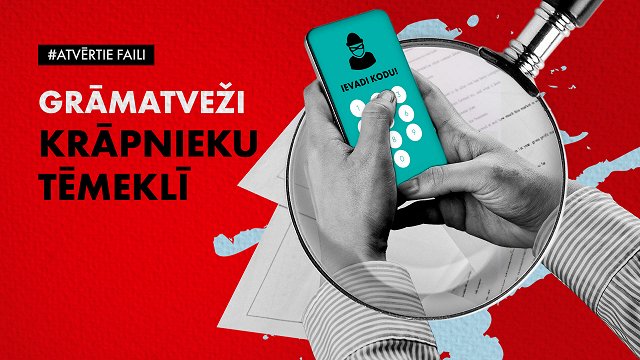It has already been reported that 7 persons, skinheads, were arrested recently for inciting national, ethnic and racial hatred, as well as for failing to report a crime. Pre-trial investigations are continuing.
The items that were found in the homes of the skinheads during the investigation included an object similar to a firearm, a large quantity of cartridges, skinheads' clothing, and a flag praising the Russian Empire with the inscription "We are Russians. God is with us". The group attacked food delivery couriers, both physically and through humiliation.
"All these attacks were filmed with mobile phones and the videos taken were published on the internet accordingly. So, the attacks were carried out because, according to their subcultural ideology, only white, i.e. light-skinned, people should live in Latvia," said Arvis Ješkins, head of the Riga Criminal Police Department of the State Police.
Among those detained last week are 6 minors and 1 adult. Most of them are now in custody, along with those detained already in spring.
"On April 20 this year, the leader of the skinhead group was detained and the criminal proceedings initiated against him have now been handed over to the prosecutor's office for prosecution. And this person is still in custody," Ješkins continued.
Whether the different skinhead groups cooperated with each other is also being clarified.
Signs praising Hitler can be seen in the VEF and Čiekurkalns neighborhoods. Attacks have taken place in the center, in Vērmanes Garden, in the Old Town, in supermarkets and at the Central Station, and in Purvciems.
Their victims are waiting for them outside restaurants where couriers pick up deliveries or outside apartment blocks where the customers to whom the food is delivered live.
This happened to a courier who did not want to make his identity public but agreed to tell us what he had experienced.
"When I approached the staircase, I just heard a noise behind me. Well - I just heard a bunch of people running up. And suddenly I turned around and saw... I don't know, like 10 people. Young people. Running towards me. They saw that I was white, they just said - oh, no, dudes! It's ours, let's leave, they just all turned and ran away," he said.
Asked what language the attackers spoke, the courier replied that they were Russian-speaking. He could not see any specific faces in the dark, but he often saw young people in skinhead clothes in Purvciems.
"I have seen them here too. I have seen them many times in the district. And after that event, I told all the couriers I saw - I told them to be careful. Because you can get hit on the head here," he said.
Police refrain from commenting on the number of skinhead sympathizers in Latvia.
"How widespread, I won't mention to you right now, but what I want to stress in this case, when we have minors, I want to inform parents that they should pay attention to their children's habits, and react to them in time. And to prevent them accordingly," said the Head of the Riga Criminal Police Department of the State Police. "The second thing is that in any case, you can turn to the police."
Victims, however, most often do not go to the police. This has been found in the past when surveying food delivery couriers.
"They don't go to the police and complain because [..] they don't want to offend anyone, they don't want any trouble, they are very law-abiding," said Maija Spuriņa, a researcher at the Latvian Academy of Culture and a doctor of social sciences.
"And very modest. At least the ones we talked to, like Indians, Sri Lankans. Sri Lankans who come from an economically collapsed country and are very happy to be here, they don't want to, they'd rather endure, and they won't complain unfortunately," she added.



























